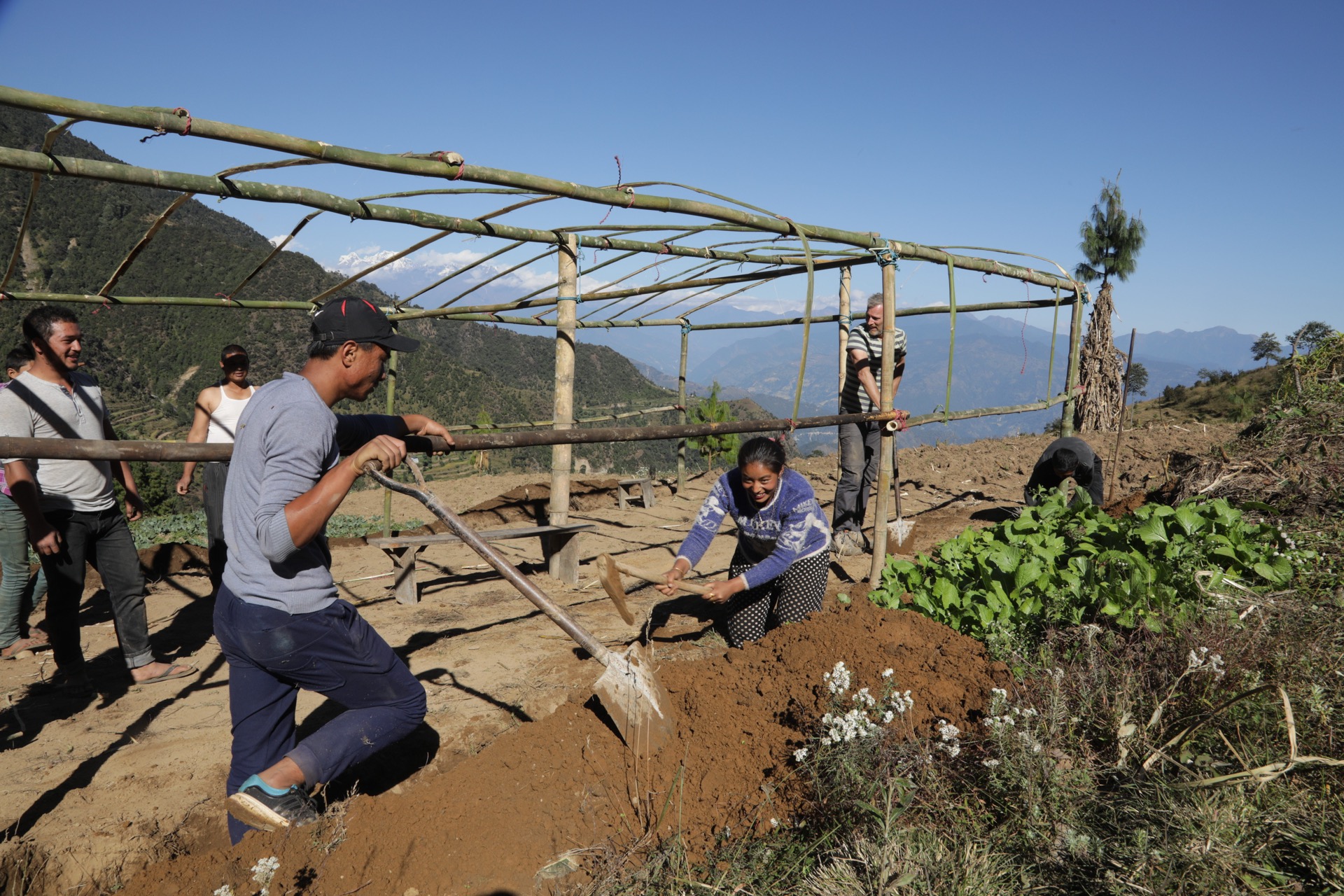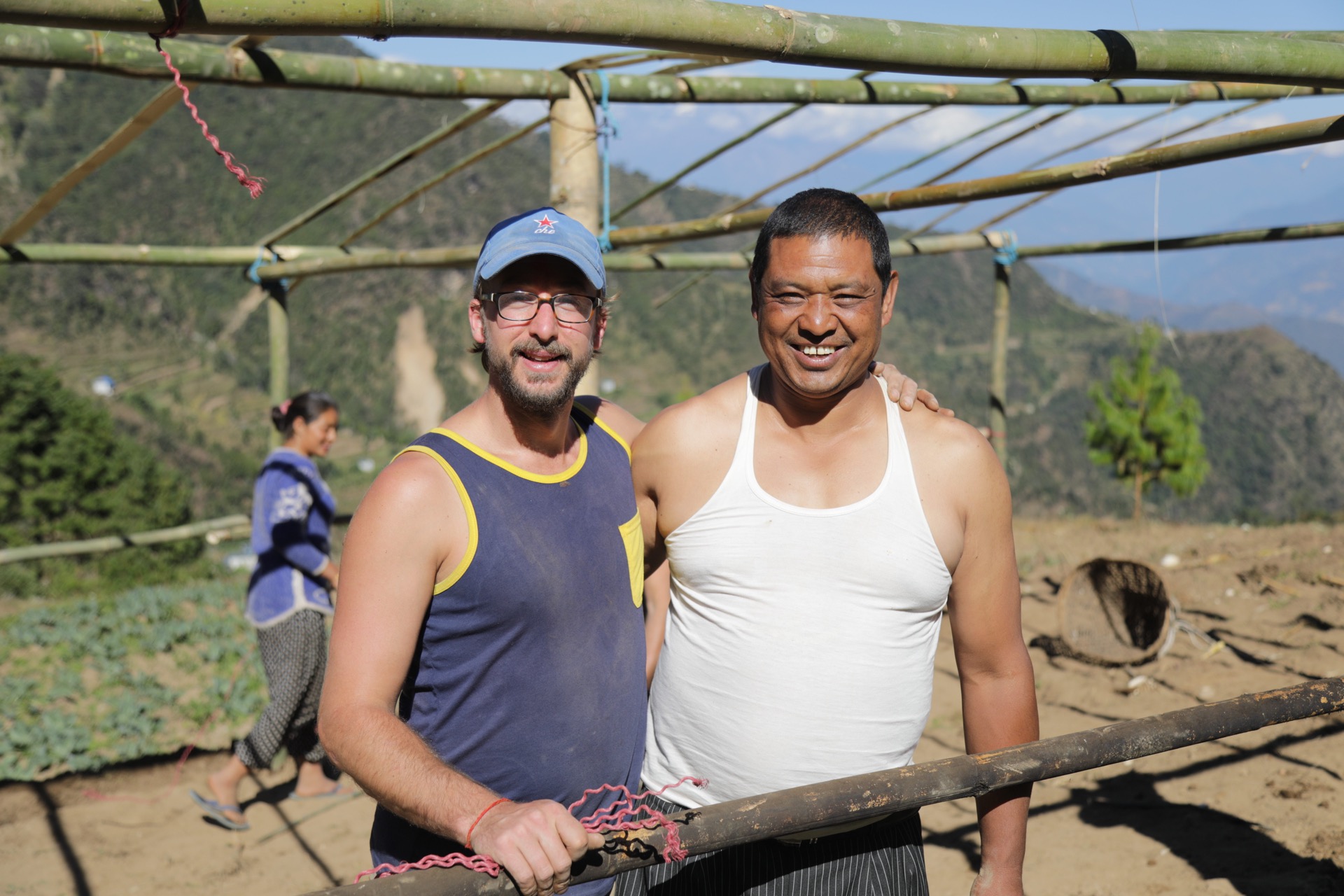In April 2019 we went to the village of Solagar in Okhaldunga district. Here we donated school material to the small local school and also had the chance to review the two greenhouse we established here already 3 years ago. We where happy to see that the greenhouse of this Tamang family was still used very well.
Greenhouse Review in Deorali, Okhaldunga - March 2019
While returning back to Okhaldunga and Solu district we had the opportunity to to the 3de year review of some of the greenhouses we initiated.
Below one of the two greenhouses of Deorali in Okhaldunga district.
Greenhouse Review in Goiry, Okhaldunga - March 2019
While returning back to Okhaldunga and Solu district we had the opportunity to to the 3de year review of some of the greenhouses we initiated.
Below the greenhouse that had many metamorfoses and had to be rebuild many time because of storm winds. The great thing about the family managing the greenhouse is that every time they restore it very nicely and keep making the best use of the greenhouse plastics and seeds provided.
Goals for the Gorkha Aid Journey - April 2019
Whyia goals
Handover 5 new whiteboards to the school
Review the use of the donated laptop and projector
Visit the families of Rabina and Ganga and discuss the option of jumping class for both of the girls as proposed by the teacher team
Teach first-aid - Was to sick to teach
Dungla goals
Handover 5 new whiteboards to the school
Handover other school materials to one of the school teachers.
Macha Khola goals
Handover school materials to one of the school teachers.
Kerauja Besi goals
Review the greenhouse of Thuli Gurung
Handover new seeds
See the living conditions of the family and housing
VRIJWILLIGER Gert Groenewoud, OVER ZIJN ervaringen met MICRO-CARE NEPAL
Written by: Gert Groenewoud
Educatie materialen & kleding voor scholen in Gorka en Solu-Khumbu district.
Over the past few years it has become very clear to me that I wanted to give something back to the world, but I was not sure what this could be.
The earthquakes of 2015 hit me…To see small villages being completely destroyed, infrastructure destroyed, seeing people dying, amongst them children, made me want to do something. For me, this was the moment I realized that I wanted to help Nepal, but I was not sure how.
Let me introduce myself to you. My name is Gert Groenewoud. I am 50 years of age, married to Petra and have 2 children, Jesse and Zoe. I remembered Nepal from the time I spent there on my honeymoon some years ago as being a beautiful and welcoming country. The people were always smiling even when they hardly had anything. A friend introduced me to Micro-Care Nepal. After meeting Pim (Founder of Micro-Care Nepal) it was even more clear that I could really do something for Nepal.
Micro-Care Nepal stands for small projects in the most remote places of Nepal. In all their projects they work closely together with local people.What makes me want to start projects with Micro-Care Nepal is that they really improve the people’s lives. And in a sustainable way. The projects focus on the poorest in small remote mountain villages. Micro-Care Nepal is different because they teach people how to manage the projects themselves. On the website www.microcarenepal.org you can find a choice of all types of donations for the projects.
All of them are very deliberate and personal. And these days more important; you will be able to see what we do with your donations. You will receive newsletters with stories and photos of the families we help with your donations. Also want to stay informed about our initiatives? Subscribe on microcarenepal.org for the newsletter.
My personal motivation? The healthier and happier people I see, the better. I hope with this message I have given you something to think about. If so, please make a donation because Nepal needs it!
Thank you for your support,
Gert, Groenewoud
Februari 2017
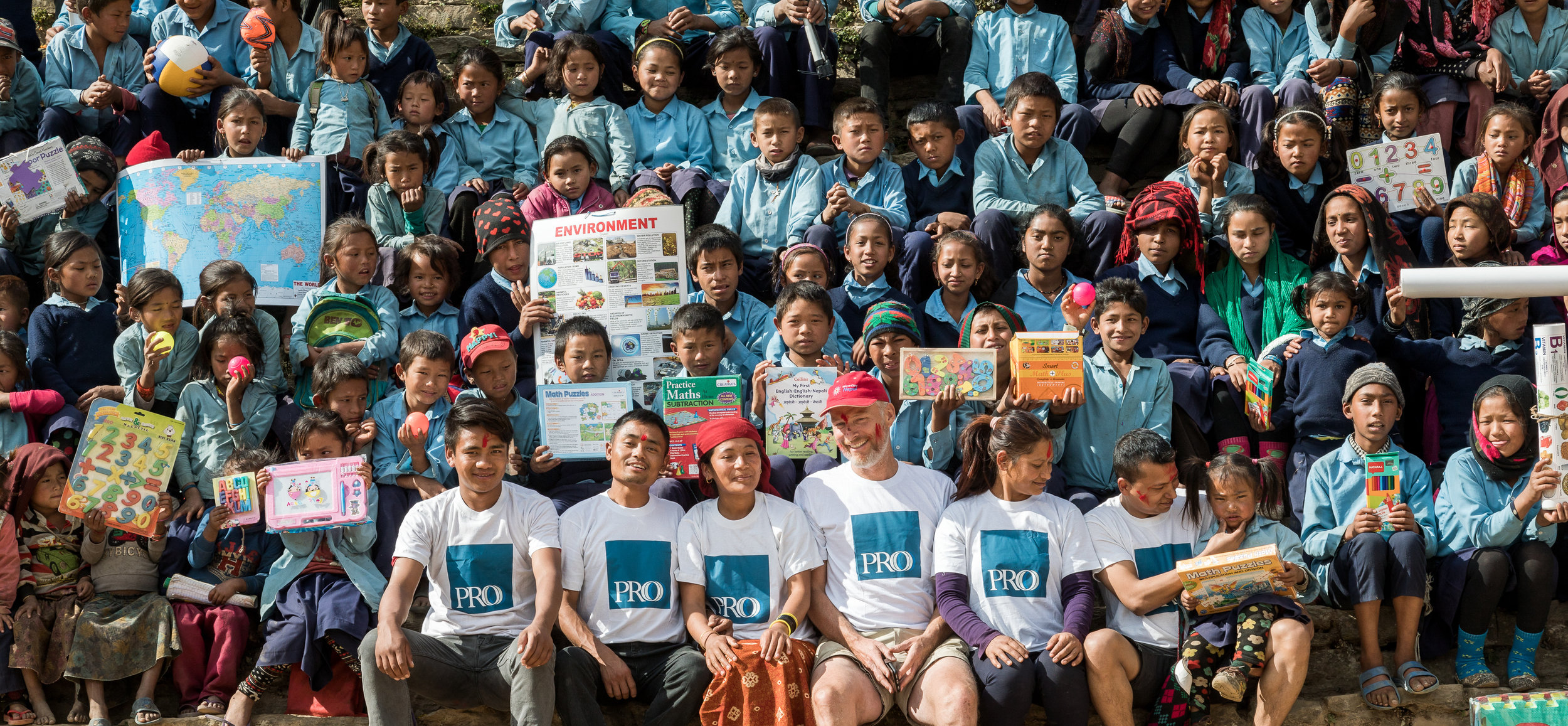
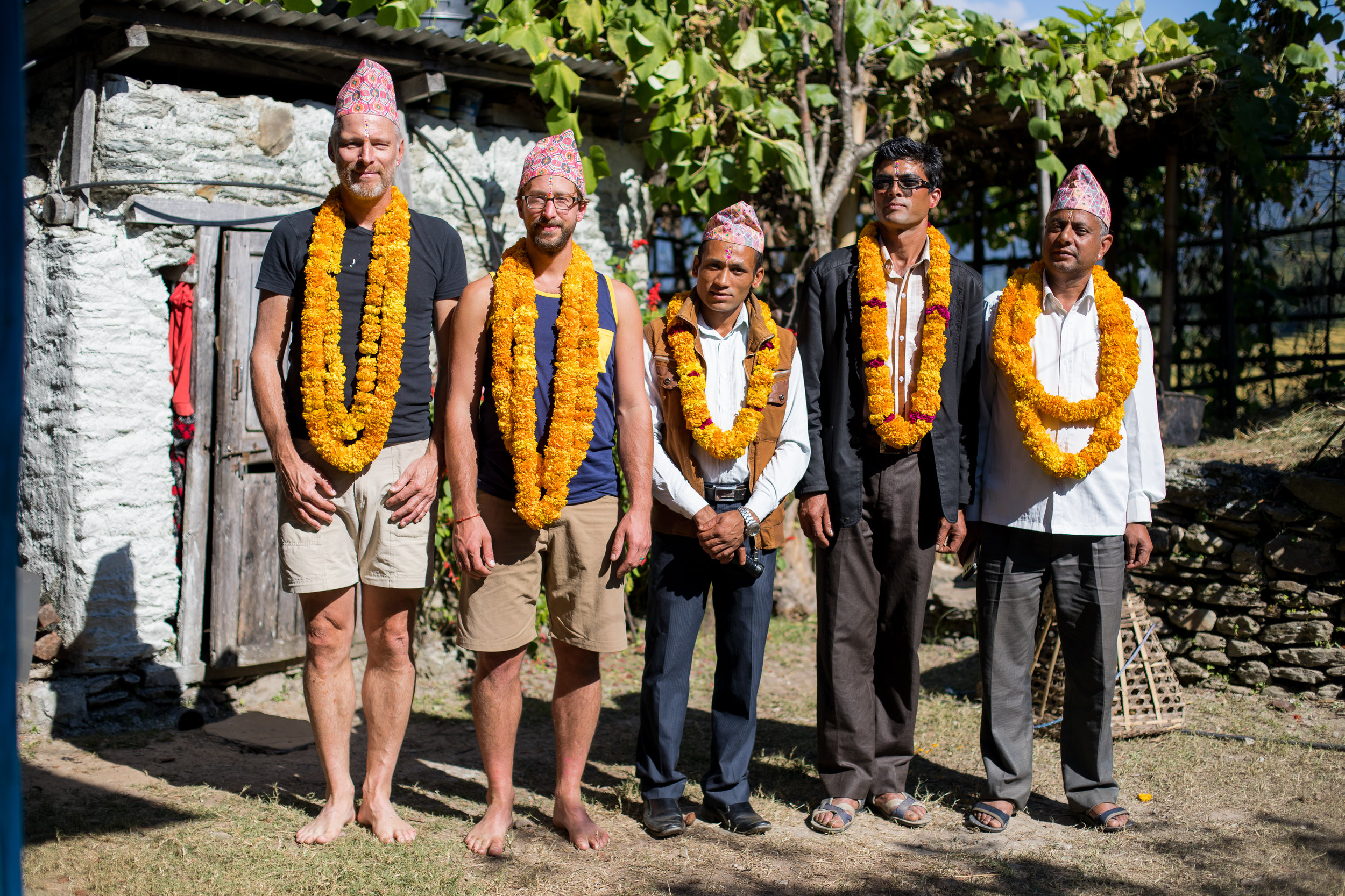
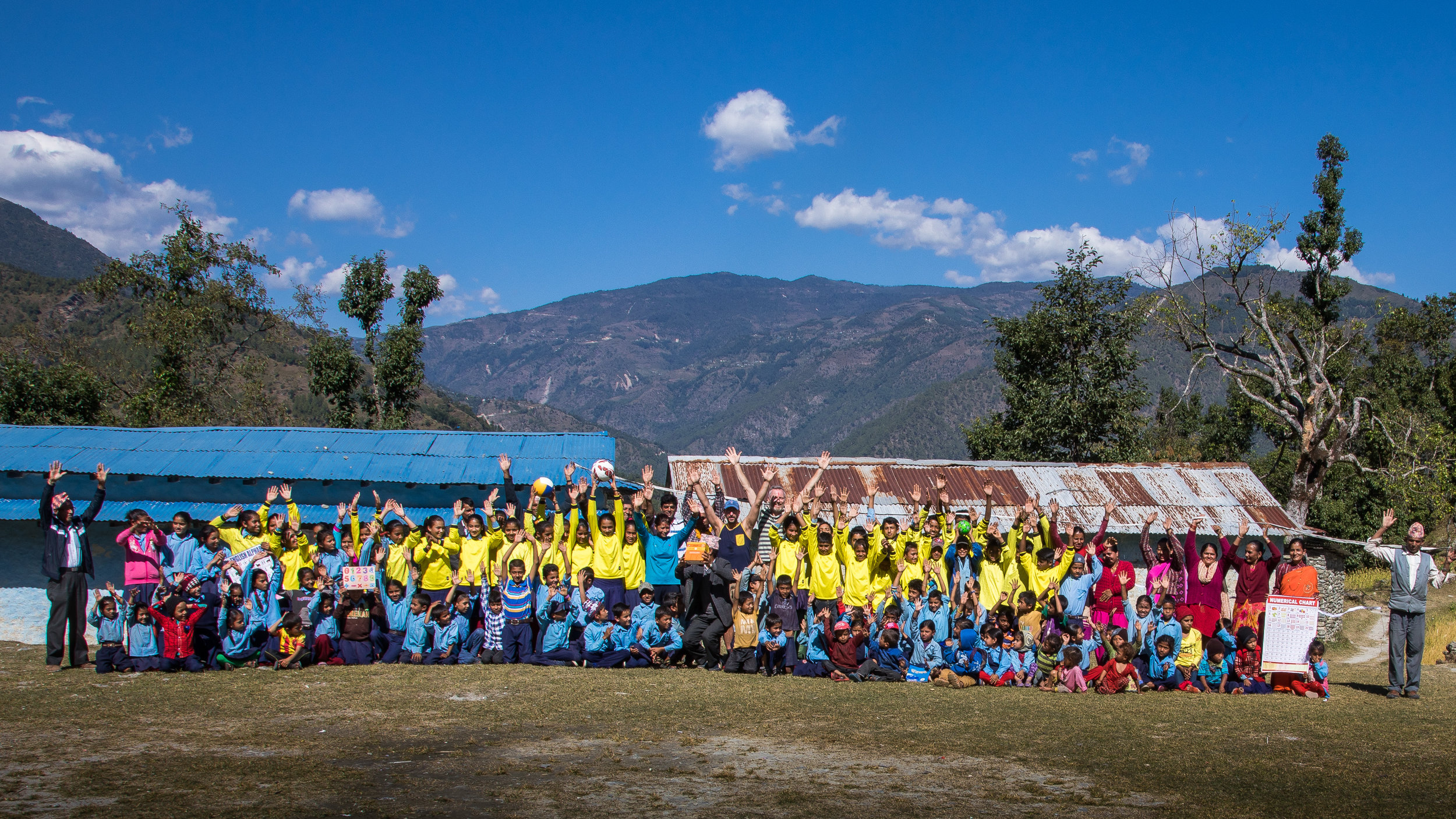
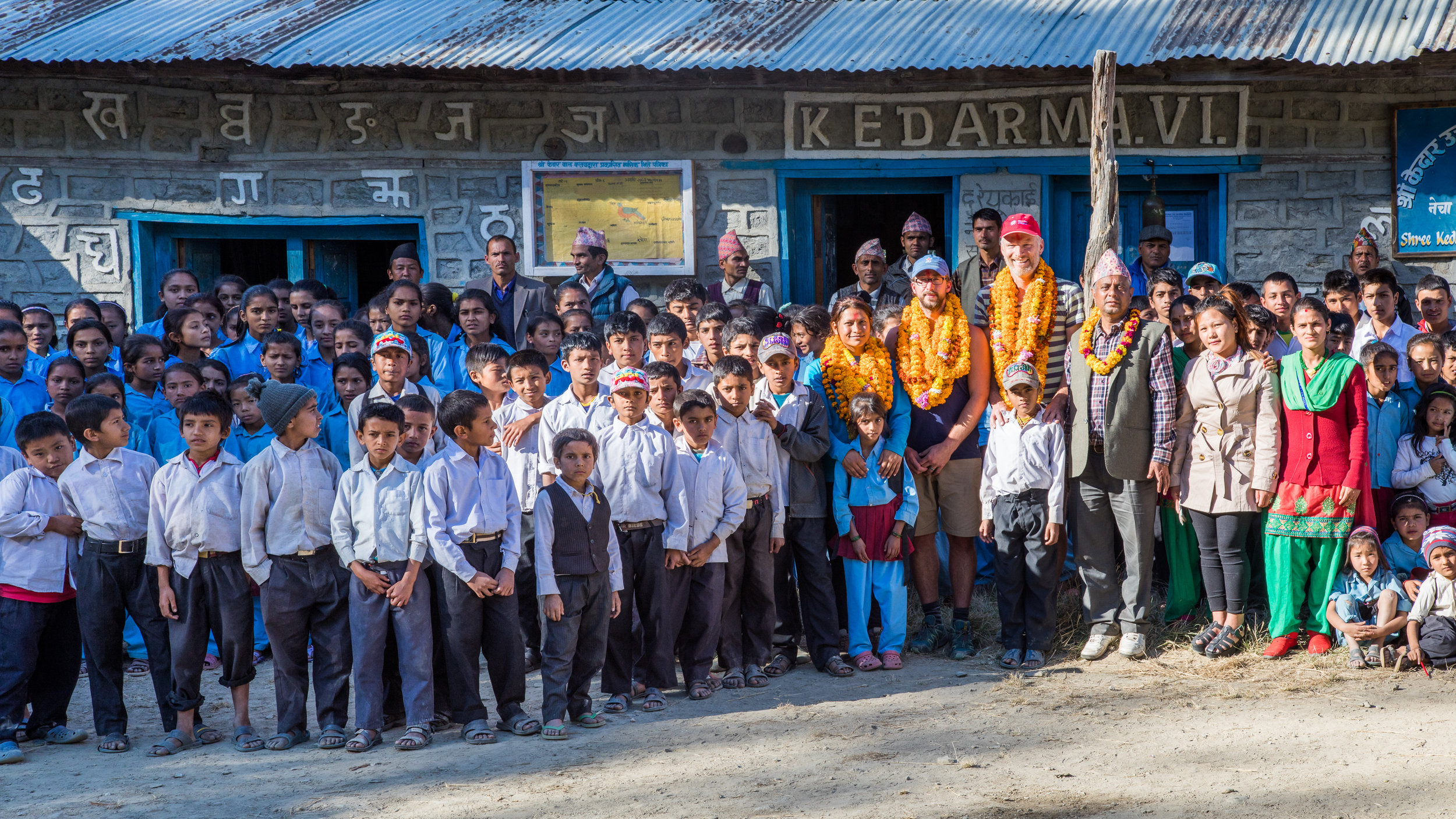
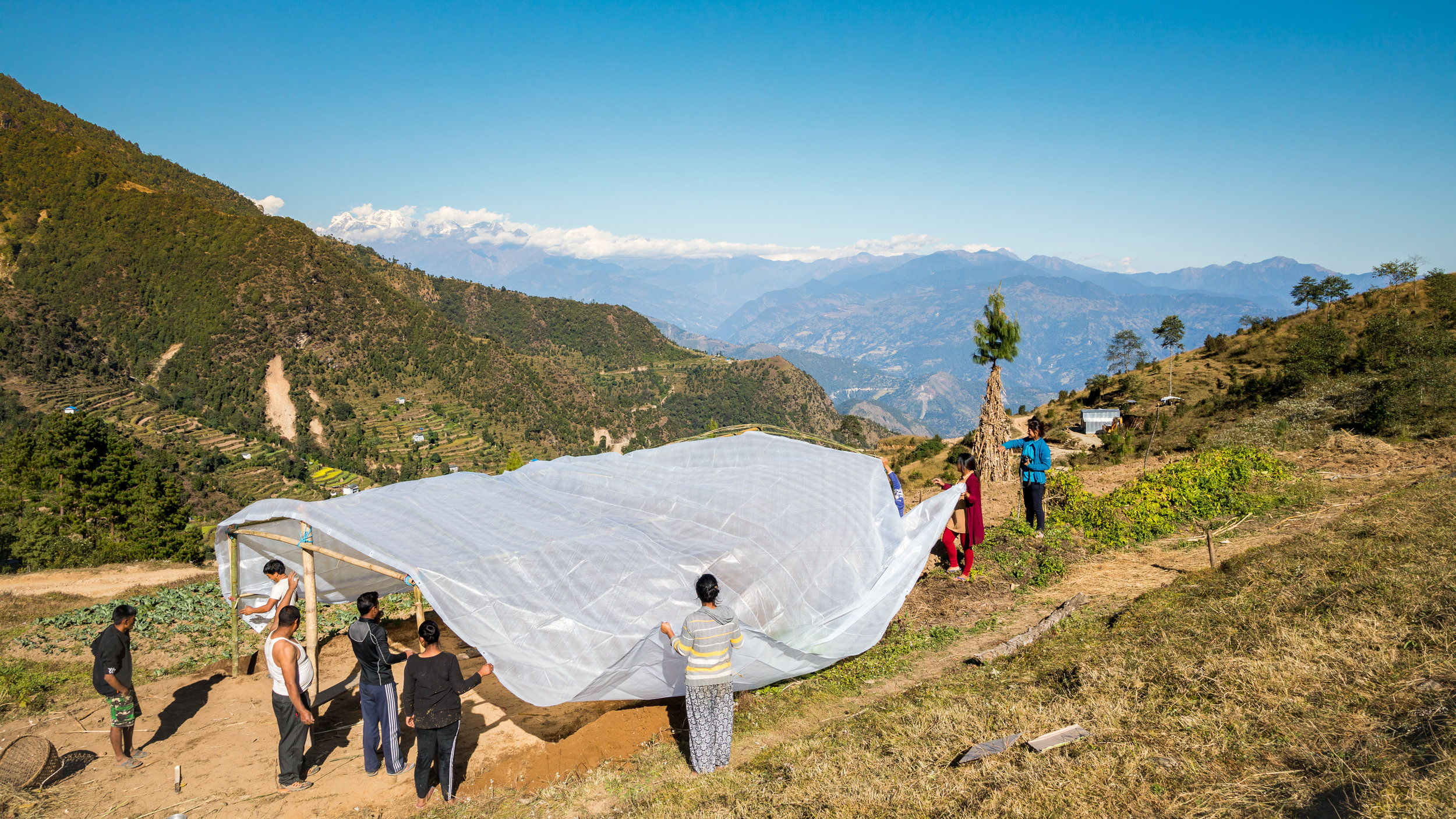
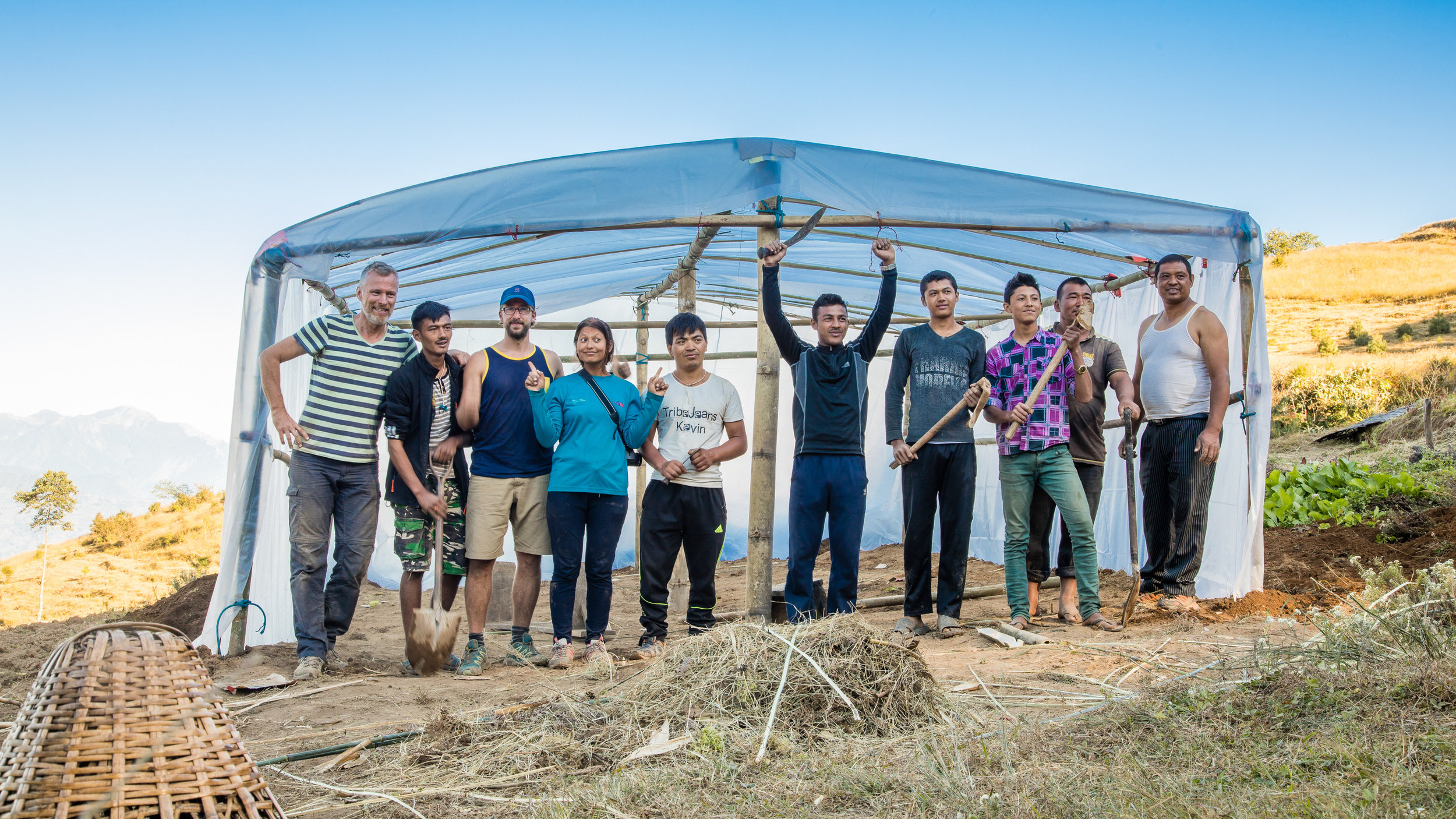
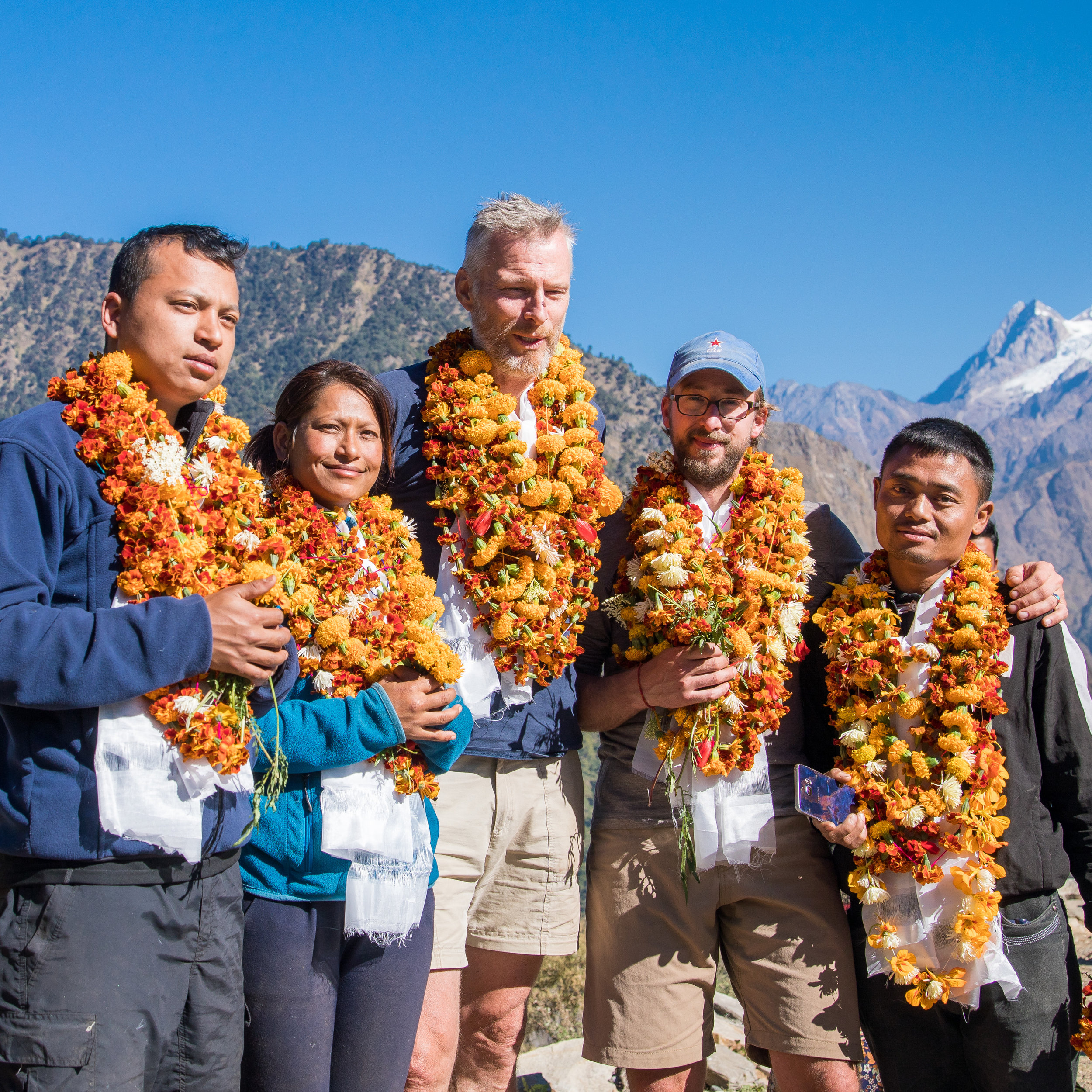
On to the most remote village of Gorkha district, our biggest distribution trip
Today we left on the biggest distribution trip for Micro-Care Nepal untill now. Providing the people of the most remote villages in Gorkha district with clothing, educational materials and greenhouses. 200 kg of relief materials, including 50 kg of clothing and shoes, 12 greenhouse plastics and 50 kg of school materials. Our team includes 2 volunteers, 5 porters and 2 board members.
Gert, Bhupu, Samjhana, Pim
During our 10 day trip we will establish more collaborations with local schools to develop their government education. Together with the teachers from each school we will make a 10 x 5 meter greenhouse and handover farming and nutrition guidance.
Waiting on our bus at our storage depot we got confronted with a big problem. Our head or porter group, who was inside of the bus, didn't told the bus driver on time to stop the bus to pick us up. The bus passed us and 5 minutes later it wanted to wait for us but not return. Quickly we had to find another vehicle to take all our luggage. After a while we could find a jeep driver with a foreigner. After packing all luggage on the rooftop the driver got confused with our story and told us he was thinking we where his clients that he supposed to pickup. We had to take all luggage of again and start over. It took us another 10 minutes to find a local van for our luggage and a taxi to transport us to the bus that was luckily still waiting for us. We reached soon to put all our materials on the rooftop of the bus and take off. A stressful start of the morning. We have to catch another bus and keep later this day to reach Soti Khola. Hopefully the rest of the day will be at least a bit according to plan....
Micro-Care Nepal continues projects in SoluKhumbu district
5 November 2016
After finishing the greenhouse with the teachers of the school in Goiri.
Text by Pim Horvers:
The first week of work back in Nepal is finished. Together with volunteer Gert Groenewoud we donated school materials to 6 schools in SoluKhumbu district.
- We visited two dalit communities to handover clothing.
- We donated a greenhouse to a small undeveloped school. Together with the teachers we made the greenhouse and handed over a course book and seeds.
It was a tight schedule with finishing our days walking in dark to reach our destination and achieve our goals.
Handing over clothing to the lower cast (Dalits) in a Necha-Batase.
Also ladies join the físycal work with full dedication.
The head of the school, Prem Shrestha.
Text by volunteer Gert Groenewoud:
At the beginning of 2016 I started to make the plans to join Micro-Care Nepal.
Micro-Care Nepal is a NGO that was started April 2015 directly after the eathquake that hit the Nepali in the heart. During and after this earthquake around 8000 people got killed. Any people lost their houses. Now still people are living in tents trying to make the best of what is left in their life. Some children lost both of their parents and still they keep going on. We believe that we can not change the world just by ourselves but we believe in small projects with that can have a big impact in people's lives. Our projects should make more development possible also in the future and even without us.
"I am proud to be part of this team. In my first week we were able to help 6 schools in the SoluKhumbu district with educational material. We made a collaboration between the local communities and schools. Together we build greenhouses and distributed clothing for the lower cast (Dalits)."
"This first week of work for Micro-Cer Nepal really struck me!"
Joined forces. Gert and me attaching the sides of the greenhouse.
Applying the plastics on top of the bamboo greenhouse frame.
The firsts plastic got on top of the 10 x 5 meter greenhouse. With these plastics it will be able to fully close this greenhouse during the cold evenings in this mountain village.
Next week Micro-Care Nepal will continue his projects in Gorkha district, visiting Muchu Khola, Uiya, Korla, Korla besi, Singla and Laprak. We will distribute clothing and support schools. Our goal is to improving education, introduce waste management which is one of the overal problems in Nepal, we will talk about the nutrition and the necessity of eating more varieties of food.
Small projects, but we strongly believe small projects can have juge impact on the lives of people. If we can motivate and guide them to development then they will continue and pass things on to the people surrounding them.
Developing our Greenhouse projects
Handing over one of the plastic sheets to a teacher and his family.
Early morning we got up to handover one of the big plastic sheets to a teacher and his family. A greenhouse farming group has been formed in Necha and together they will build a new greenhouse.
Without the help of Micro Care Nepal these families would never have been able to buy the plastic sheeting ….which costs the equivalent of two years’ pay!
The second greenhouse established by Micro Care Nepal in Necha.
This family already had a greenhouse and the father was attending a course in greenhouse farming run by the Ministry of Agriculture. The bamboo frame was ready so we could finish this greenhouse very quickly. They just needed the support of Micro Care Nepal in providing the plastic sheeting to cover their greenhouse and then they could start farming.
Our friend was joking for the picture, pretending to fall from his dangerous local ladder! He has already been attending greenhouse education course and was reading to us from his text book.
Domaraj tying bamboo together.
Laughing in between work.
One of the teachers helping us to tie the bamboo together with wire.
During the afternoon we walked around the village to handover more photos to people and to have a look at the beautiful views of the valleys.
Dili Bastola posing with his children while working on his fields. Dili is starting a fish business by creating a fish pond just bit lower on the mountain.
The beautiful rice terraces of Necha.
Posing with her photo wearing traditional clothing. The yellow and green necklace and the bracelets on her arm signify that she is married.
Preparing the field before planting the rice.
STARTING OUR GREENHOUSE PROJECT AND GIVING CLOTHES TO POOR FAMILIES
Morning view from Rohit’s uncle's house. Morning mist is slowly moving up the mountainside after a night of heavy rain.
Rohit’s uncle measuring up for a new greenhouse.
2015/08/10
Today we were happy to start preparing the land for a greenhouse at Rohit’s uncle’s house. Built with the support of Micro-Care Nepal Foundation this will be a completely organic greenhouse which will grow lots of varieties of vegetables. In the rainy season it will house plants which do not like too much water and in winter, plants that otherwise would not grow in the cold weather. We made measurements, set borders with lines, divided the land from the rice field with a sand wall and harvested potatoes and young, fresh pumpkin leaves (which are used in a type of curry). Later the land was ploughed using an ox.
Rohit and his aunty taking the potatoes from the ground and preparing the land for the greenhouse.
Boy from a poor family living nearby happy to try on his new shirt.
Fitting a new t-shirt. Very shy and a bit surprised by the presence of this white foreigner!
Shy but very happy with her new clothing.
Little girl wearing her new t-shirt and now trying on new trousers.
Both proudly posing with their new clothing.
Preparing the land with the help of a team of oxen before planting rice.
This afternoon we were invited at a wedding. On the way we stopped at several houses to meet family and friends. We also met a few teachers who teach in a small local school. I visited this school in 2014 and I made a donation because it is one of the poorest in the village. With Rohit translating we discussed Micro-Care Nepal Foundation’s projects. It was good to hear how positive the teachers were and they invited us for a community meeting at 7am the next morning.
Taking the new rice plants from the field where they sprouted, ready to plant them in a bigger rice field with more space in between so they will grow in to big plants.
Boy with a big smile while trying on his new shirt.
Posing with his new shirt in one of the temporary shelters made from bamboo with plastic sheeting for a roof.
Rohit’s aunty gave us some meat from a freshly slaughtered goat. We could not leave without eating some! Rohit made a stick for me and prepared it like a bbq.
Group of children with their grandmother wearing new clothes provided by Micro-Care Nepal Foundation.
Mother who we gave a used telephone provided by Dutch contacts. Now she could also communicate with family and friends.
Boy posing with his new sports vest.
We climbed up the hill to the house of Rohit’s wife's family. There we gave clothing to the family and also to a very poor family living next door. Their clothing was ripped in many places and had been worn so many times it was impossible to clean anymore. They were all very happy, this was easy to see. I had taken some photos of their family in Kathmandu with me. They were especially happy to see these pictures of their daughters and grandchild.
Grandmother of the family wanted to pose, wearing her new shirt, with her ox.
From a poor family, this father is carrying old corn plants which will be fed to the family’s animals.
Happy.
Shy.
Proud.
Me with a poor family from Necha. The family is wearing clothing donated by Dutch people and distributed by Micro-Care Nepal Foundation.
We visited the wedding next door to give our best wishes to the new couple. This wasn't a marriage arranged by the couple’s parents but a love marriage (where the couple chose to marry each other themselves).This is becoming more and more common in the cities but in the traditional villages arranged marriages are still very much the norm. Some of the younger generation are still very happy that their parents make the decision to choose their life partners. They trust their parents will make the best choice; better than they would make themselves.
Rohit's sister in law. Transformed with new clothes from a poor village girl to a business women.
Rohit's mother in law.
Their goats are their biggest friends, until they are killed to provide meat to feed the family.
One of the more colourfully dressed women.
